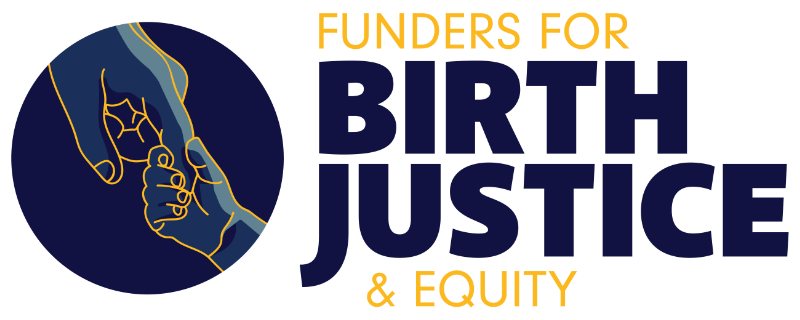This article originally appeared on the Grantmakers In Health website.
There has long been a movement of Black, Indigenous, and People of Color (BIPOC) birth and reproductive justice leaders addressing the impact of racism and oppression on pregnant and birthing people and their families. Their work has galvanized funders and policymakers to focus their efforts on ending the inequities in birth outcomes, opening up a national conversation about advancing community driven solutions to our country’s perinatal health crisis as well as creating opportunity for change within philanthropy.
Our current funding approaches, however, are not moving the needle quickly enough to save lives. How can funders change their practices and direct resources to the field that meaningfully center justice, equity, and the vision of grassroots community leaders? How can funders work together to examine our practices and collaborate to better support the efforts and leadership of Black, Indigenous, and People of Color?
In November 2022, more than 100 funders came together in Atlanta, GA to examine these questions at the first ever Birth Equity Funder’s Summit organized by bi3, Community Health Acceleration Project, Funders for Birth Justice and Equity, Grantmakers In Health, Ms. Foundation for Women, Pritzker Children’s Initiative, and the W.K. Kellogg Foundation in partnership with the Mom and Baby Action Network.
During the Summit we heard from movement leaders like Jennie Joseph, founder and CEO of Commonsense Childbirth, who implored funders to turn our appetite for innovation on ourselves and the way we fund. We talked about the experience of trust-based philanthropy from the perspective of grantees and funders. We dove deeply into the topics of policy, supporting the birthing workforce, and how to best measure transformational change. We also surfaced tensions and critical questions for funders to hold as we develop funding strategies that shift power to communities and support liberatory practices.
The Summit planning committee and the consulting team of Afton Bloom are developing a comprehensive report on themes and practical steps for funders that came out of the Summit (to be found at www.fundersforbirthjusticeandequity.org). In summary, we as funders must:
- Cultivate trust with community-based organizations, center the communities they serve, and value their innovation.
- Work across focus areas to address the intersectional issues impacting the families funders aim to support.
- See ourselves as part of the ecosystem by making a long-term, dedicated investment in community-led solutions.
- Work together across geographies and issues.
- Collaborate with public funders to do the same.
- Support community-led narrative shifts about the birthing workforce and the communities they support.
Many of the Summit’s next steps will be housed in a new-but-not-new funder affinity group named Funders for Birth Justice and Equity. Members include funders new to the Birth Justice field like the Robert Wood Johnson Foundation, as well as many funders who have a long history resourcing grassroots models and leaders addressing inequities in birth outcomes like the Groundswell Fund and Irving Harris Foundation.
Funders for Birth Justice and Equity was born out of the Midwifery Funders Group, a decade-old learning network of funders interested in the midwifery model of birth as a solution to the poor outcomes and high cost of the U.S. maternity care system.
The Midwifery Funders Group’s evolution to Funders for Birth Justice and Equity better reflects our vision of a transformed and just maternity care system, grounded in community-based solutions led by BIPOC leaders. As a funder collaborative, we share these values:
- Birth is a reproductive health, rights, and justice issue.
- Any disparity in outcomes by race, gender, place, and class is unacceptable.
- We support models of care led by those most impacted by maternal and infant mortality and morbidity: BIPOC, rural, LGBTQ+, and low-income communities.
- When practitioners from doulas and perinatal health workers to midwives to physicians work in alignment with birthing people, it benefits the birthing person and their family.
- The experts on the experiences of birthing people are birthing people themselves.
- We understand that pregnancy, birth, and postpartum are normal physiologic processes, not a disease.
- Our funding solutions and approach seek to decolonize philanthropy (Villanueva 2018). We conspire with the communities most impacted to shape and directly inform the work of Funders for Birth Justice and Equity.
In 2023, Funders for Birth Justice and Equity will engage in its first full year of expanded activity, building on the momentum of the Summit. Our entire mission is focused on aligning funding with the needs of the field. To that end we will:
- Establish a Field Advisory Committee to inform our work and articulate what the needs of the field are and are not.
- Develop a map of funders now active in this area so that we may build relationships, collaborate, and cofund.
- Start a comprehensive mapping of the field, driven by field leaders.
- Continue our education series that lifts up on-the-ground successes and examines important intersectional issues.
- Offer a deep-dive education program into the root causes of the inequities in birth outcomes.
- Plan our next opportunities to gather.
There is much opportunity and much to do. Funders for Birth Justice and Equity is the go-to place for any funder to find the education, framework for change, resources, peer support, and collective action opportunities needed to fund systemic and transformative change. Join us by visiting our website, attending our events, reading our blog, and contacting Strategic Advisor Betsy McNamara at bmcnamara@fullcirclenh.com.
Written By
Joanna Lauen, Program Director, Reproductive Health and Justice, Irving Harris Foundation
Melissa Gradilla, Director of Grantmaking, Every Mother Counts
Naa Amissah-Hammond, Senior Director of Grantmaking, Groundswell Fund
Sona Smith, Program Officer, Birth Justice, Ms. Foundation for Women
References
Villanueva, Edgar. Decolonizing Wealth: Indigenous Wisdom to Heal Divide and Restore Balance. Oakland: Berrett-Koehler Publishers, October 16, 2018.


0 Comments